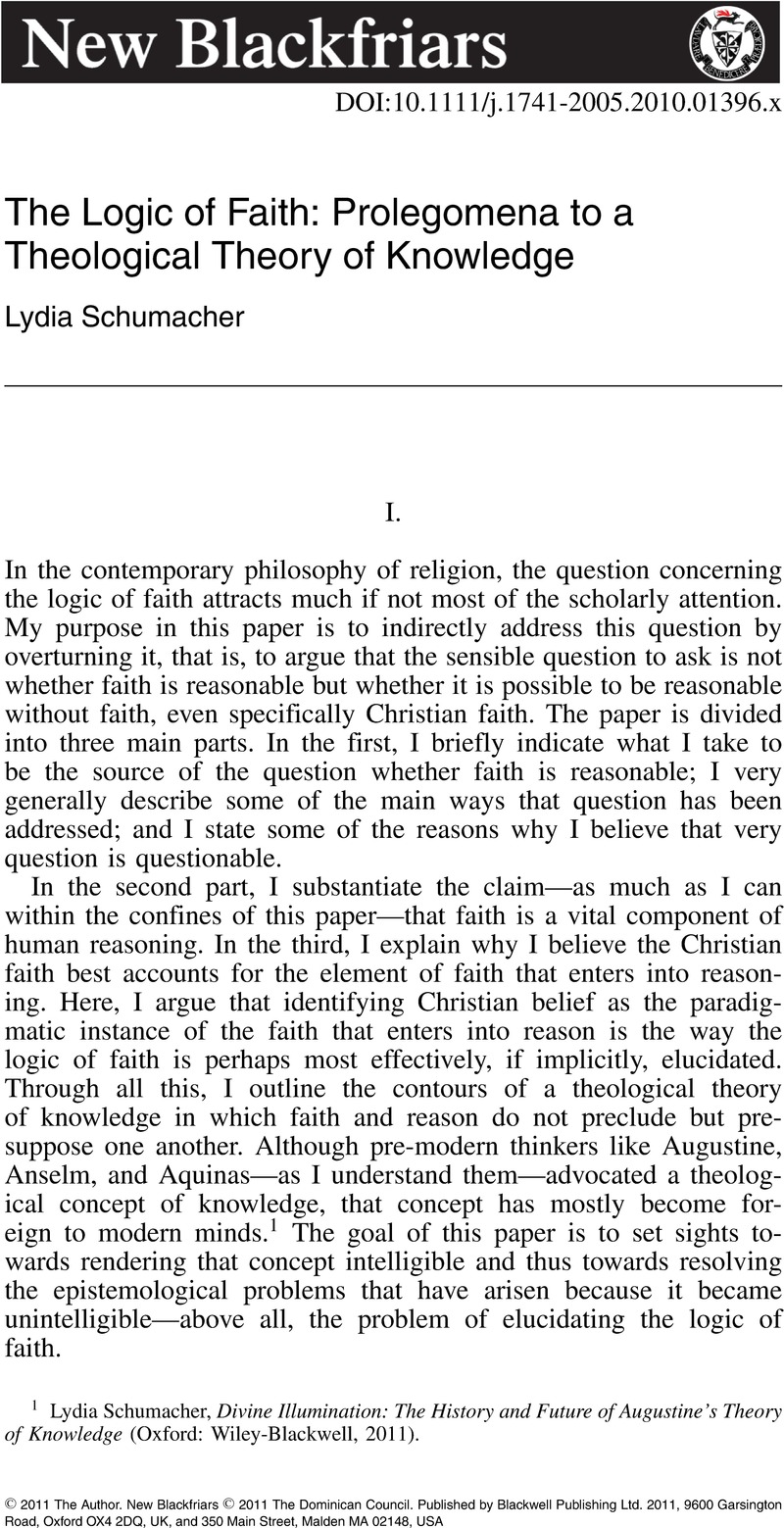Article contents
The Logic of Faith: Prolegomena to a Theological Theory of Knowledge
Published online by Cambridge University Press: 01 January 2024
Abstract

- Type
- Original Articles
- Information
- Copyright
- Copyright © 2011 The Author. New Blackfriars
References
1 Schumacher, Lydia, Divine Illumination: The History and Future of Augustine's Theory of Knowledge (Oxford: Wiley-Blackwell, 2011)CrossRefGoogle Scholar.
2 Prominent objectors to the rationality of belief in God include David Hume, Immanuel Kant, and more recently, W. K. Clifford, J. L. Mackie, Bertrand Russell, and Michael Scriven.
3 The Neo-Thomist Catholic thinkers of the twentieth century are some of the most famous proponents of the natural theological project against which Protestants like Karl Barth and even some Catholics reacted. Another more recent proponent of the argument that the existence of God can be demonstrated from the cosmos is Craig, William Lane, The Kalam Cosmological Argument (London: Macmillan, 1979)CrossRefGoogle Scholar. The slightly more moderate conclusion of the renowned natural theologian Richard Swinburne is that theistic proofs provide probable as opposed to incontrovertible evidence for God's existence. See The Existence of God (Oxford: Clarendon Press, 1979)Google Scholar.
4 Blaise Pascal, Soren Kierkegaard, and Ludwig Wittgenstein are usually cited in discussions of fideism, although it is possible to argue that those who have labeled these thinkers fideists have seriously misunderstood them.
5 Plantinga, Alvin, Warranted Christian Belief (Oxford: Oxford University Press, 2000)CrossRefGoogle Scholar; Wolterstorff, Nicholas, Reason within the Bounds of Religion (Grand Rapids: Eerdmans, 1976)Google Scholar.
6 See Swinburne, Richard, Review of Warranted Christian Belief by Plantinga, Alvin, Religious Studies 37 (2001), pp. 203–14CrossRefGoogle Scholar.
7 This includes Jean-Francois Lyotard and Jacques Derrida in the Continental tradition and Edmund Gettier in the analytic.
8 Phenomenologists I have in mind include Edmund Husserl and Maurice-Merleau Ponty; pragmatists include C.S. Peirce and William James. Michael Polanyi's magnum opus is titled, Personal Knowledge: Towards a Post-Critical Philosophy (Chicago: University of Chicago Press, 1974)Google Scholar.
9 See Kerr, Fergus, Immortal Longings: Versions of Transcending Humanity (Notre Dame: University of Notre Dame Press, 1997)Google Scholar.
10 Prov. 6:16–19.
11 Jn. 3:19–20. 5:20, “I seek not to please myself but Him who sent me.”
12 Jn. 14:6.
13 Jn. 15:1–8: abide in me; 15:9–17: remain in my love.
14 1 Thess. 5:17.
15 Jn. 17:3.
16 1 Cor. 13:13: faith working in love.
17 Mt. 11:30.
18 Jn. 6:29, “Jesus answered, the work of God is this: to believe in the one He has sent.”
19 Jn. 8:34–6, “I tell you the truth: everyone who sins is a slave to sin … if the Son sets you free, you will be free indeed.”
20 Gal. 5:22–23.
21 Jn. 11:25: “I am the resurrection and the life;” 12:25: “The man who loves his life will lose it, while the man who hates his life in this world will keep it for eternal life.” As St. Augustine wrote in his sermon on 1 John 4:4–12, “love God and do what you will.”
22 Chesterton, G.K., Orthodoxy (New York: Doubleday, 1959), 148Google Scholar.
23 Sayers, Dorothy, Creed or Chaos: Why Christians Must Choose Either Dogma or Disaster (Manchester, NH: Sophia Institute Press, 1999)Google Scholar.
24 G.K. Chesterton Orthodoxy 23: “mysticism keeps men sane … the whole secret of mysticism is this: that man can understand everything by the help of what he does not understanding;” 29: “it is idle to talk always of the alternative of reason and faith. Reason itself is a matter of faith;” 104: “some faith in life is required even to improve it … some dissatisfaction with things as they are is necessary even in order to be satisfied.”
25 1 Pet. 3:15.
- 1
- Cited by




